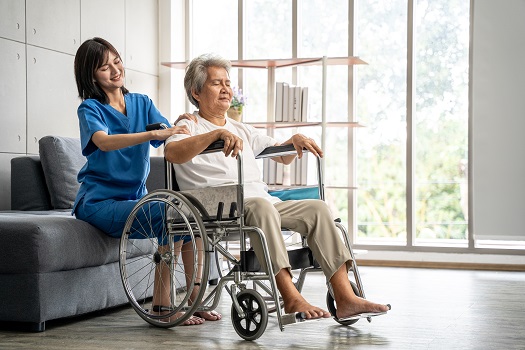Discovering the Unique Attributes of Modern Memory Care Homes for Seniors
Modern memory Care homes for elders prioritize safety and security and interaction. These facilities include lively styles and safe atmospheres to promote health. Team participants are specially trained to offer individualized help, developing a supportive neighborhood. Special attributes, such as ingenious technology and all natural wellness tasks, improve the top quality of life for citizens. Recognizing these components reveals exactly how they greatly affect the day-to-day experiences of elders encountering memory difficulties. What other elements add to this advancing landscape?
Made for Safety
As senior citizens navigate the obstacles of memory-related problems, modern memory Care homes are thoroughly made to prioritize safety and protection. These facilities include attributes such as safe entryways and departures to avoid roaming, an essential factor to consider for citizens with memory impairments. Hallways are designed to minimize confusion, usually featuring clear signs and color-coded areas to help orientation.Additionally, team member are educated to respond and identify to the special requirements of citizens. Emergency situation feedback systems are integrated throughout the facility, ensuring quick help when required. The design commonly includes open rooms that promote presence, permitting caregivers to keep an eye on citizens without intruding on their autonomy.Moreover, furnishings are selected with safety and security in mind, preventing sharp edges and making use of non-slip products to lower autumn risks. In general, these carefully thought about elements create an environment that fosters both independence and safety, necessary for promoting the well-being of seniors encountering memory difficulties.
Engaging and Boosting Settings
Creating engaging and stimulating settings in modern memory Care homes is necessary for boosting the top quality of life for citizens. These environments are thoughtfully made to promote interaction and cognitive interaction, including vivid colors, all-natural light, and open spaces that urge movement and exploration.Activities customized to the rate of interests and capabilities of homeowners, such as art therapy, music sessions, and horticulture, foster a feeling of function and connection. Common locations, such as comfy lounges and task spaces, promote socializing amongst residents, aiding to battle feelings of isolation.Additionally, interactive setups and sensory gardens can evoke positive memories and stimulate the detects, better enriching the everyday experiences of residents. By prioritizing these engaging aspects, memory Care homes create a vibrant ambience that not only supports cognitive function yet additionally nurtures emotional wellness, eventually causing a much more fulfilling and lively life for seniors dealing with memory challenges.
Specialized Care and Support Solutions
Specialized Care and assistance services play an important function in enhancing the high quality of life for elders in memory Care homes. These solutions consist of personalized Care strategies customized to specific demands, memory enhancement tasks created to promote cognitive function, and considerable staff training programs to guarantee efficient support. personalized memory care. Together, these aspects develop a holistic strategy to memory Care that resolves both the physical and emotional well-being of citizens

Personalized Care Plans
Many contemporary memory Care homes recognize the significance of customized Care plans in boosting the high quality of life for elders with cognitive impairments. These tailored strategies are established with detailed analyses that think about each citizen's case history, preferences, and specific needs. Care groups team up with households, making certain that all elements of the homeowner's wellness are dealt with, from daily routines to social communications. This individualized approach promotes a complacency and belonging, as homeowners take part in activities that resonate with their personal backgrounds and rate of interests. Additionally, normal assessments of these Care strategies enable modifications based upon altering demands, ensuring that elders receive the most reliable assistance. This commitment to customization is a trademark of modern-day memory Care homes.
Memory Improvement Tasks
Effective memory enhancement activities play a critical function in the general Care given in contemporary memory Care homes. These tasks are created to stimulate cognitive function and promote engagement among residents. Incorporating games, challenges, and memory workouts encourages social interaction and can help maintain psychological acuity. Structured memory treatment allows senior citizens to share personal stories, cultivating links with caregivers and peers alike. Furthermore, music and art treatment work as effective tools, using emotional memories and enhancing overall health. Consistently scheduled team activities not only combat feelings of seclusion however additionally create a sense of routine, which is crucial for residents with memory impairments. Ultimately, these thoughtfully created activities support cognitive health and wellness and enhance the high quality of life for seniors in memory Care settings.
Team Training Programs
Training programs for staff in memory Care homes are important for providing specialized Care and assistance solutions to residents. These programs normally concentrate on comprehending dementia, interaction strategies, and behavior management techniques. Team member are educated to acknowledge the unique needs of individuals with memory disabilities, promoting a helpful setting that enhances citizens' lifestyle. Additionally, training highlights the value of compassion and patience, equipping caregivers with the abilities to manage challenging situations properly. Ongoing education and learning assurances that team stay updated on ideal practices and developments in memory Care. Inevitably, trained team add significantly to the general wellness of residents, assisting in a nurturing environment that advertises dignity, regard, and engagement in everyday tasks.
Personalized Care Plans

Neighborhood and Social Communication
Community and social communication play a vital role in enhancing the health of elders staying in contemporary memory Care homes. These settings are made to promote connections among homeowners, advertising friendships and assistance networks that are critical for emotional health and wellness. Taking part in group activities-- such as crafts and arts, workout classes, or social getaways-- encourages participation and assists battle feelings of seclusion that can typically come with memory-related conditions.Additionally, structured social communications permit citizens to share their experiences and reminisce, which can be helpful and restorative for cognitive function. Personnel typically help with chances for residents to attach, ensuring that everyone feels consisted of and valued.
Ingenious Technology Assimilation
As contemporary memory Care homes evolve, the combination of innovative modern technology has become a cornerstone for enhancing the lifestyle for seniors. Facilities are significantly embracing innovative tools such as clever home systems, which permit homeowners to regulate their atmosphere easily, thus advertising independence. Wearable gadgets equipped with wellness surveillance functions offer caretakers with real-time data, making it possible for timely interventions and individualized Care plans.Moreover, online fact and interactive applications are being made use of to boost cognitive feature and produce interesting experiences, assisting locals reconnect with previous memories. Interaction modern technologies, such as video conferencing, enable elders to keep connections with household and buddies, decreasing feelings of isolation. Furthermore, staff training programs integrate technology to guarantee caretakers are well-equipped to make use of these advancements properly - boutique memory care. In general, the thoughtful integration of modern technology in memory Care homes promotes a supportive setting that boosts both safety and interaction for residents, eventually enhancing their day-to-days live
Emphasis on Holistic Wellness and Activities
Modern memory Care homes significantly prioritize alternative health and involve homeowners in numerous tasks that cultivate psychological, physical, and psychological health. Mindfulness and meditation practices aid grow internal peace, while structured fitness programs enhance movement and stamina. Additionally, creative arts involvement provides a restorative outlet, motivating self-expression and social interaction among elders.
Mindfulness and Meditation Practices
While numerous elders face difficulties related to amnesia, incorporating mindfulness and meditation methods can greatly boost their general well-being. These techniques advertise a feeling of calm and help decrease anxiety, cultivating emotional stability. In contemporary memory Care homes, structured mindfulness next page sessions permit locals to participate in breathing workouts and led images, which can boost focus and recognition. Furthermore, reflection motivates representation, assisting elders connect with their ideas and sensations in a safe atmosphere. Activities such as gentle yoga or tai chi more complement these methods, promoting relaxation and enhancing mental quality. By prioritizing mindfulness and reflection, memory Care homes create a holistic approach to health that supports both the mind and spirit of elders.
Physical Fitness Programs
Fitness programs play an essential role in promoting holistic health for elders in memory Care homes. These programs are created to improve physical wellness, improve wheelchair, and foster social interaction amongst residents. Tasks such as gentle yoga exercise, guided walking sessions, and toughness training workouts are customized to suit differing levels of capacity, ensuring inclusivity. Regular involvement in these fitness initiatives not only helps preserve physical strength but likewise adds to emotional health by lowering anxiety and clinical depression. Furthermore, fitness programs typically include group activities, encouraging camaraderie and building a feeling of neighborhood. By concentrating on both psychological and physical aspects of wellness, memory Care homes develop an atmosphere that supports overall wellness and enriches the lives of their locals.
Creative Arts Engagement
Interaction in imaginative arts acts as an essential element of all natural wellness for elders in memory Care homes. Tasks such as paint, dancing, and music not only promote cognitive functions but likewise foster emotional expression and social communication. These imaginative outlets enable residents to explore their identities and get in touch with their pasts, substantially enhancing their general top quality of life. Additionally, organized art programs customized to private capacities advertise a sense of success, minimizing feelings of seclusion and anxiety. By incorporating creative arts into day-to-day regimens, memory Care homes offer an improving setting that supports psychological, emotional, and social wellness. Ultimately, these activities add to a lively neighborhood where seniors really feel valued and engaged.
Frequently Asked Questions
What Is the Average Expense of Modern Memory Care Homes?
The typical cost of contemporary memory Care homes typically varies in between $4,000 and $8,000 monthly, relying on location, solutions offered, go now and facility services, mirroring the specialized Care and setting given for residents.
Just How Do Family Members Choose the Right Memory Care Home?
Households usually review memory Care online on area, team credentials, features, and total ambience. Individual brows through, conversations with caretakers, and evaluates from various other family members likewise play crucial functions in their decision-making process.
What Certifications Do Employee Have in Memory Care Homes?
Staff participants in memory Care homes normally possess specialized training in mental deterioration psychology, nursing, or Care. Qualifications in emergency treatment and CPR, in addition to experience in dealing with behavioral difficulties, are frequently needed to ensure quality resident assistance.

Are Memory Care Homes Controlled by Any Kind Of Agencies?
Memory Care homes are managed by numerous firms, consisting of state health departments and licensing boards. These guidelines ensure that facilities satisfy specific standards for safety and security, Care quality, and team qualifications to protect locals' health.
Can Locals Bring Personal Items to Memory Care Homes?
Locals usually have the chance to bring personal things to memory Care homes, which can help produce a acquainted and soothing setting. Standards may vary by facility, so inspecting with administration is advisable. Specialized Care and assistance services play an important role in improving the top quality of life for elders in memory Care homes. Many modern memory Care homes acknowledge the value of individualized Care plans in improving the top quality of life for seniors with cognitive problems. Efficient memory improvement tasks play a critical duty in the general Care offered in modern memory Care homes. Educating programs for staff in memory Care homes are vital for delivering specialized Care and assistance solutions to residents. While each person's journey through memory loss is one-of-a-kind, customized Care strategies are necessary in contemporary memory Care homes to address the particular demands and choices of seniors.